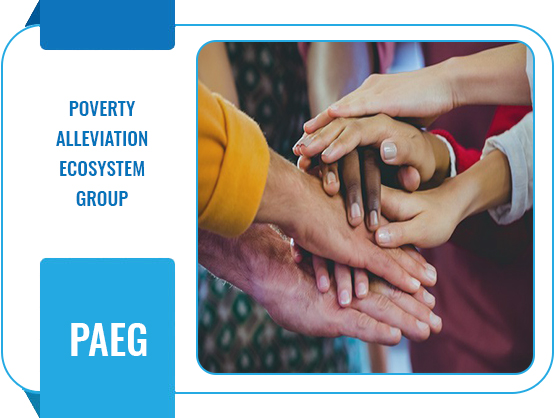
Poverty Alleviation Ecosystem Group (PAEG)
The Poverty Alleviation Ecosystem Group (PAEG) is a dedicated research entity focused on understanding, analyzing, and addressing the complex challenges associated with poverty and inequality. PAEG adopts a multidisciplinary approach to research, collaborating with experts from various fields to develop innovative solutions and strategies for poverty alleviation.
Here’s a detailed overview of PAEG’s research concentration, interests, and activities:
Understanding Poverty Dynamics
PAEG conducts research to understand the multidimensional nature of poverty and the underlying factors that contribute to its persistence. This includes analyzing socio-economic indicators, such as income levels, education attainment, healthcare access, and housing conditions, to identify vulnerable populations and assess their needs. PAEG’s research aims to uncover the root causes of poverty, including structural inequalities, discrimination, lack of social protection, and access barriers, in order to inform targeted interventions and policy recommendations.

Poverty Measurement and Assessment
PAEG develops methodologies and tools for measuring and assessing poverty levels, dynamics, and trends at local, national, and global scales. This includes adopting multidimensional poverty indices that go beyond income-based measures to capture various dimensions of well-being, such as education, health, employment, housing, and social inclusion. PAEG’s research also explores participatory approaches to poverty assessment, involving affected communities in the design, implementation, and evaluation of poverty alleviation initiatives.
Impact Evaluation of Poverty Interventions
PAEG conducts rigorous impact evaluations of poverty alleviation interventions, including social protection programs, livelihood support initiatives, microfinance schemes, and community development projects. This involves employing experimental and quasi-experimental research designs, such as randomized control trials (RCTs) and propensity score matching, to assess the effectiveness, efficiency, and equity of poverty interventions. PAEG’s research aims to generate evidence on what works, for whom, and under what conditions in poverty reduction efforts, informing policy decisions and program design.
Social Protection and Safety Nets
PAEG explores the role of social protection programs and safety nets in mitigating the impacts of poverty and vulnerability. This includes researching the design, implementation, and outcomes of cash transfer programs, food assistance schemes, conditional cash transfers, and social insurance schemes in providing income support, promoting human capital development, and building resilience among poor and vulnerable populations. PAEG’s research examines the impact of social protection on poverty reduction, health outcomes, education attainment, and economic empowerment, as well as the cost-effectiveness and sustainability of social protection interventions.
Livelihoods and Economic Empowerment
PAEG focuses on livelihoods promotion and economic empowerment strategies to enable poor and marginalized populations to improve their income-generating activities, access productive assets, and participate in formal and informal economies. This includes researching microenterprise development, skills training programs, access to finance initiatives, and market linkages for smallholder farmers, women entrepreneurs, and youth in poverty-affected areas. PAEG’s research explores the pathways to economic empowerment, including the role of education, vocational training, technology adoption, and entrepreneurship development in fostering sustainable livelihoods and poverty reduction.
Gender Equality and Women’s Empowerment
PAEG examines the intersection of poverty, gender inequality, and women’s empowerment, recognizing the disproportionate impact of poverty on women and girls worldwide. This includes researching gender-responsive policies, programs, and interventions that address the specific needs and priorities of women in poverty alleviation efforts. PAEG’s research explores women’s access to resources, decision-making power, and participation in economic, social, and political spheres, as well as the role of gender norms, stereotypes, and cultural practices in perpetuating poverty and exclusion.
Community-Based Approaches to Poverty Alleviation
PAEG advocates for community-based approaches to poverty alleviation that empower local communities, strengthen social cohesion, and promote sustainable development from the bottom-up. This includes researching participatory development methodologies, community-driven development models, and grassroots initiatives that mobilize community assets, knowledge, and resources to address poverty challenges. PAEG’s research emphasizes community participation, ownership, and empowerment in the design, implementation, and evaluation of poverty alleviation projects, ensuring their relevance, effectiveness, and sustainability.
Policy Advocacy and Capacity Building
PAEG engages in policy advocacy and capacity-building activities to influence policy decisions, raise awareness, and build the capacity of governments, civil society organizations, and development practitioners in poverty alleviation strategies. This includes disseminating research findings, organizing policy dialogues, and providing technical assistance and training on evidence-based approaches to poverty reduction. PAEG’s research aims to bridge the gap between research and practice, fostering knowledge exchange, learning, and collaboration among stakeholders working towards a common goal of poverty eradication.
Environmental Sustainability and Poverty
PAEG explores the nexus between environmental sustainability and poverty alleviation, recognizing the interconnectedness of environmental degradation, climate change, and poverty traps. This includes researching sustainable natural resource management practices, climate resilience strategies, and ecosystem-based approaches to poverty reduction. PAEG’s research examines the impact of environmental degradation on livelihoods, food security, and vulnerability to natural disasters, as well as the potential co-benefits of conservation and sustainable resource use for poverty alleviation.
Urban Poverty and Informal Settlements
PAEG focuses on urban poverty and informal settlements, where a growing proportion of the world’s poor reside, particularly in developing countries. This includes researching the unique challenges faced by urban poor populations, such as inadequate housing, lack of access to basic services, and limited economic opportunities. PAEG’s research explores strategies for improving living conditions in informal settlements, enhancing urban infrastructure, and promoting inclusive urban development policies that address the needs of marginalized urban communities.
Migration, Displacement, and Poverty
PAEG examines the linkages between migration, displacement, and poverty, particularly in the context of forced displacement, conflict, and humanitarian crises. This includes researching the socio-economic impacts of displacement on host communities, refugees, internally displaced persons (IDPs), and migrant populations, as well as the role of migration in shaping poverty dynamics and livelihood strategies. PAEG’s research explores policies and interventions that support the socio-economic inclusion of displaced populations, facilitate their access to basic services and livelihood opportunities, and promote their integration into host communities.
Social Cohesion and Conflict Resolution
PAEG investigates the role of social cohesion, peacebuilding, and conflict resolution in poverty alleviation efforts, recognizing the detrimental effects of conflict and violence on development outcomes. This includes researching the drivers of conflict, social fragmentation, and polarization, as well as the impact of peacebuilding interventions on poverty reduction, reconciliation, and community resilience. PAEG’s research explores the nexus between poverty, inequality, and social exclusion, and the potential of inclusive development strategies to address underlying grievances and build sustainable peace.
Technology and Innovation for Poverty Alleviation
PAEG explores the potential of technology and innovation to accelerate progress towards poverty alleviation goals, including through the use of digital technologies, mobile applications, and innovative solutions for service delivery, financial inclusion, and livelihood enhancement. This includes researching the impact of digital platforms, fintech solutions, and e-commerce initiatives on access to markets, financial services, and employment opportunities for poor and marginalized populations. PAEG’s research also examines the role of social innovation, frugal innovation, and open innovation approaches in developing context-specific solutions to poverty challenges.
Psychosocial Well-being and Poverty
PAEG considers the psychosocial dimensions of poverty, including the impact of poverty-related stress, trauma, and stigma on mental health, social relationships, and overall well-being. This includes researching the intersection of poverty with mental health disorders, substance abuse, and interpersonal violence, as well as the barriers to accessing mental health services and psychosocial support for poor and vulnerable populations. PAEG’s research explores holistic approaches to poverty alleviation that integrate psychosocial support, community resilience-building, and mental health promotion into development interventions.
Data Innovation and Evidence-Based Decision-Making
PAEG promotes data innovation and evidence-based decision-making in poverty alleviation efforts, recognizing the importance of reliable data, robust monitoring, and evaluation systems for tracking progress, identifying gaps, and informing policy choices. This includes researching data collection methodologies, data analytics techniques, and data visualization tools for poverty mapping, targeting, and impact assessment. PAEG’s research aims to strengthen the capacity of governments, civil society organizations, and development partners to collect, analyze, and use data effectively in poverty reduction strategies and programs.
Intersectoral Collaboration and Multi-stakeholder Partnerships
PAEG investigates the importance of intersectoral collaboration and multi-stakeholder partnerships in poverty alleviation efforts. This includes researching effective mechanisms for coordinating actions across government agencies, civil society organizations, academia, private sector entities, and community-based groups to maximize synergies, leverage resources, and scale up impact. PAEG’s research explores models of collaboration, institutional arrangements, and governance structures that facilitate collective action and foster sustainable development partnerships.
Youth Empowerment and Employment
PAEG focuses on youth empowerment and employment as key drivers of poverty reduction and sustainable development. This includes researching youth employment trends, skills gaps, and labor market dynamics, as well as the barriers faced by young people in accessing decent work and economic opportunities. PAEG’s research examines strategies for promoting youth entrepreneurship, vocational training, apprenticeships, and job placement services to enhance youth employability, foster economic inclusion, and harness the demographic dividend.
Health Equity and Access to Healthcare
PAEG explores the intersection of health equity and poverty alleviation, recognizing the importance of universal health coverage and access to quality healthcare as essential components of human development. This includes researching disparities in health outcomes, healthcare access, and healthcare utilization among different socio-economic groups, as well as the impact of health shocks on household well-being and poverty dynamics. PAEG’s research examines strategies for improving health service delivery, strengthening health systems, and promoting preventive healthcare interventions to address the health needs of poor and marginalized populations.
Education for All and Lifelong Learning
PAEG advocates for education for all and lifelong learning as fundamental drivers of poverty eradication and social mobility. This includes researching access to quality education, equity in educational outcomes, and the impact of education on poverty reduction, economic empowerment, and social inclusion. PAEG’s research explores innovative approaches to inclusive education, such as early childhood development programs, adult literacy initiatives, and non-formal education opportunities, that cater to the diverse needs of learners across the lifespan.
Crisis Response and Humanitarian Assistance
PAEG examines the role of crisis response and humanitarian assistance in addressing acute poverty situations, including those caused by natural disasters, conflicts, and public health emergencies. This includes researching emergency relief interventions, humanitarian aid delivery mechanisms, and disaster risk reduction strategies aimed at providing immediate assistance to affected populations, protecting livelihoods, and rebuilding resilient communities. PAEG’s research explores the integration of humanitarian and development approaches to support recovery, reconstruction, and long-term poverty alleviation in crisis-affected contexts.
Policy Advocacy and Social Justice
PAEG engages in policy advocacy and social justice initiatives to address systemic barriers to poverty alleviation and promote equity, fairness, and human rights. This includes researching policy reform agendas, advocacy campaigns, and grassroots movements that challenge discriminatory practices, promote social inclusion, and empower marginalized communities. PAEG’s research aims to amplify the voices of the poor and marginalized, mobilize political will for policy change, and advance progressive policy agendas that prioritize poverty reduction and social justice.
Ethical Considerations and Community Participation
PAEG emphasizes ethical considerations and community participation in poverty alleviation research and practice, recognizing the importance of ethical principles, informed consent, and community engagement in ensuring the dignity, autonomy, and well-being of research participants and program beneficiaries. This includes researching ethical frameworks, participatory methodologies, and community-based research approaches that uphold human rights, cultural sensitivity, and social justice principles in poverty alleviation interventions. PAEG’s research aims to promote ethical conduct, transparency, and accountability in poverty research and advocacy efforts, fostering trust and collaboration among stakeholders.
By focusing on these research concentration areas and interests, the Poverty Alleviation Ecosystem Group (PAEG) contributes to advancing knowledge, informing policy, and catalyzing action in the global effort to eradicate poverty and promote sustainable development. Through interdisciplinary collaboration, stakeholder engagement, and evidence-based advocacy, PAEG seeks to harness the collective expertise and resources needed to address the root causes of poverty and build a more equitable and inclusive world for all.
